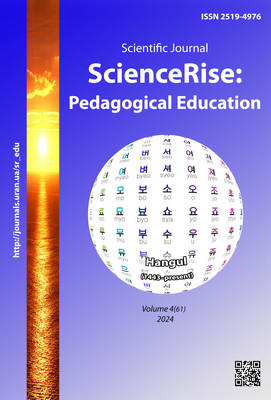Stress management in "Music performance practice" classes
DOI:
https://doi.org/10.15587/2519-4984.2024.318526Keywords:
music performance anxiety, stress management, stress management strategies in music performance, comprehensive approach to stress managementAbstract
The article is dedicated to studying the phenomenon of music performance anxiety, focusing on the characteristics of stress development during music-related creative activities. It is determined that musical activities, particularly public one, are often accompanied by increased anxiety in performers due to fear of making mistakes, the responsibility to the audience, and the need to demonstrate high levels of mastery. Anxiety, as a normal physiological response to stress, can have both positive and negative effects on performers’ productivity.
An analysis of effective methods, approaches, and strategies for stress management in productive music performance is provided. It is shown that the causes of stress states among music pedagogy students can be emotional tension, technical difficulties, and time constraints.
The cognitive-behavioural, emotionally-focused, neuropsychological, body-oriented, social-communicative, and technological approaches that can be implemented within the stress management framework in "Music Performance Practice" classes are revealed.
The article justifies the need for a comprehensive approach to managing anxiety and stress, using cognitive-behavioural methods, physiological techniques, and a social-communicative approach. This will not only aid students reduce their anxiety levels but also enable them to operate stress as a tool for achieving performance productivity and high professionalism.
Based on the results of the methodology trial, it is concluded that integrating stress management technologies into the content of the "Music Performance Practice" course is advisable.
Further research aims to develop a comprehensive pedagogical system that integrates stress management strategies into the educational process
References
- Zlochevska, L. S. (2014). Stress-management or how to attain an equilibrium and confidence. Profesiino-tekhnichna osvita, 2 (63), 47–48.
- Cole, C. (2023). Performance Anxiety for Singers: 5 Steps to Silence the Great Saboteur, Shame + Innovative Solutions. Available at: https://www.linkedin.com/pulse/performance-anxiety-singers-5-steps-silence-great-saboteur-cari-cole/
- Smith, J. C. (2002). Stress management: A comprehensive handbook of techniques and strategies. New York: Springer Publishing Company, 264.
- Quick, J. C., Wright, T. A., Adkins, J. A., Nelson, D. L., Quick, J. D. (2013). Preventive stress management in organizations. Washington: American Psychological Association, 260. https://doi.org/10.1037/13942-000
- Hu, W. (2024). Self-management of stage fright by vocal music performers: which techniques are the most effective? Current Psychology, 43 (42), 33105–33114. https://doi.org/10.1007/s12144-024-06849-x
- Lehrer, P. M., Woolfolk, R. L., Sime, W. E. (Ed.) (2007). Principles and Practice of Stress Management. New York: Guilford Press, 734.
- Tang, Y., Ryan, L. (2020). Music performance anxiety: Can expressive writing intervention help? Frontiers in Psychology, 11, 1334. https://doi.org/10.3389/fpsyg.2020.01334
- Bokoch, V., Trynko, O., Shportko, O. (2018). Do problemy vykonavskoi diialnosti estradnoho vokalista: psykholohichnyi aspekt. Naukovi zapysky Ternopilskoho natsionalnoho pedahohichnoho universytetu imeni Volodymyra Hnatiuka. Seriia Mystetstvoznavstvo, 1 (38), 17–22.
- Yang, B., Wei, H. (2023). Evaluating psychological stress in ethnic vocal performers: A big data analysis perspective on artistic innovation. International Journal of Art Innovation and Development, 4 (2), 17–26. https://doi.org/10.38007/IJAID.2023.040203
- Potapchuk, T., Onyshchuk, V., Annenkova, N. (2023). Executive skill in the creative development of music education students. Scientific Works of Interregional Academy of Personnel Management. Pedagogical sciences, 3 (56), 22–27. https://doi.org/10.32689/maup.ped.2023.3.4
- Osborne, M.S., Greene, D.J., Immel, D.T. (2014). Managing performance anxiety and improving mental skills in conservatoire students through performance psychology training: a pilot study. Psychology of Well-Being, 4, 18. https://doi.org/10.1186/s13612-014-0018-3
- Ekonomova, E. K. (2014). Methodology of psychopedagogical training of singers to the concert performance in the chamber singing class. Young Scientist, 3 (6), 90–96.
- Buniak, N. M., Cherchyk, L. M., Mylko, I. P. (2023). Samomenedzhment: navchalnyi posibnyk. Lutsk: Volynskyi natsionalnyi universytet imeni Lesi Ukrainky, 221.
- Kovalchuk, V. I. (2011). Stvorennia spryiatlyvoho navchalnoho seredovyshcha. Treninhy. Kyiv: Shkilnyi svit, 128.
- Lavrentieva, O. O. (2019). Ergonomic approach to the organization of educational health-saving environment. Health-saving technologies in the educational environment. Ternopil: Osadtsa V. M., 94–111.
Downloads
Published
How to Cite
Issue
Section
License
Copyright (c) 2024 Zakhar Duboviy

This work is licensed under a Creative Commons Attribution 4.0 International License.
Our journal abides by the Creative Commons CC BY copyright rights and permissions for open access journals.
Authors, who are published in this journal, agree to the following conditions:
1. The authors reserve the right to authorship of the work and pass the first publication right of this work to the journal under the terms of a Creative Commons CC BY, which allows others to freely distribute the published research with the obligatory reference to the authors of the original work and the first publication of the work in this journal.
2. The authors have the right to conclude separate supplement agreements that relate to non-exclusive work distribution in the form in which it has been published by the journal (for example, to upload the work to the online storage of the journal or publish it as part of a monograph), provided that the reference to the first publication of the work in this journal is included.







